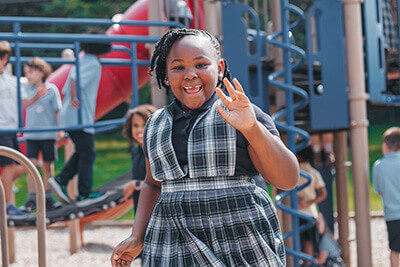September 7, 2023
 from Dr. Bill Hudson, head of school
from Dr. Bill Hudson, head of school
Daily, I am touched by the kindness of the MPA community. Most recently, the many cards and expressions of care regarding my mother’s death have helped my family and me through a very difficult time. In my experience over the last ten years, I’ve taken kindness for granted at MPA because I see it so often. I see it in the way members of the community greet one another, how students go out of their way to welcome new students, how they clean their tables after they eat, and the respect between adults and students, to name a few.
I’ve been thinking a lot about kindness or the lack of it in today’s society. People seem angrier, less patient, more rude, and sometimes cruel. At the grocery store, on TV talk shows, in line at a drive-through, on the freeway, or in restaurants, we seem to have lost our humanity. I worry about the direction our society is heading and have been struggling with what my responsibility is as both an individual and as head of school to counteract these troubling, negative trends.
I recently read a thought-provoking article in The Atlantic by David Brooks (one of my favorite authors) that has been on my mind over the last several weeks. “How America Got Mean” provides valuable perspectives on the societal shifts that have led to a decline in empathy and kindness. I highly recommend it to you. In short, Brooks identifies several factors that have contributed to this problem and offers several ideas about how to address it. “The most important story about why Americans have become sad and alienated and rude, I believe, is also the simplest: We inhabit a society in which people are no longer trained in how to treat others with kindness and consideration.”
Brooks believes that we must re-envision the moral formation we as a society provide. In particular, we must help people “learn to restrain their selfishness, teach basic social and ethical ideas, and help people find a purpose in life.” According to Brooks, institutions, especially schools, “must advance a modern vision of how to build character, provide mandatory social skills courses, create a new core curriculum, foster intergenerational service, call for a renewal of moral organizations, and insist on a return to politics as a moral enterprise.”
Character formation has been a core value since the school’s founding in 1982. It is represented in the first priority of 2024ward (our current strategic plan), calling us to prepare students to live, learn, and thrive in today’s complex, globalized society. It can also be found in our second priority, ensuring an equitable and inclusive community.
In addition to academic excellence, schools must provide students with tools to navigate their emotions, develop healthy relationships, and practice empathy. That is why teachers from all three divisions collectively researched core social-emotional competencies that can be incorporated throughout the PreK-12 curriculum. Teachers will be working this year to review their curriculum and look for ways in which these competencies can be interwoven into their classes. We added another counselor, Jeanne Doyle, to serve students.
I agree with Brooks that we must equip our students with the skills to navigate the digital world ethically and harness technology to contribute to a culture of kindness and civility. I recently appointed curriculum technology integration specialist Michael Moran to a new role as director of academic technology. Together with our technology staff, including our new librarian, Stephanie Kollm, and new Upper School curriculum technology integration specialist Sean Andrews, a committee of teachers is designing an implementation plan for a new digital wellness PreK-12 curriculum. This approach integrates digital citizenship education into the curriculum, emphasizing responsible online behavior, critical media consumption, and respectful communication.
Schools can play a pivotal role in revitalizing a sense of community by encouraging student involvement in clubs, organizations, teams, and community service. We foster a strong sense of belonging through our character education program in lower school and our advisory program in Middle and Upper Schools. Across divisions and grade levels, faculty are teaching students the value of civil discourse and critical thinking, empowering them to engage in meaningful conversations while maintaining empathy for diverse perspectives.
I have high hopes for MPA students, and I wish David Brooks would pay a visit to our school. Just yesterday, I sat in on the first Lower School CHAMP assembly. (If you are new to MPA, CHAMP stands for Character Happens at Mounds Park.) It was a joyful event, with students singing the CHAMP song and learning important lessons about kindness and mindfulness.
Together, as a community of students, families, faculty, and staff, we are actively and intentionally contributing to a more compassionate and cohesive society, one where our children not only succeed academically and professionally but also thrive as socially conscious and emotionally intelligent individuals.